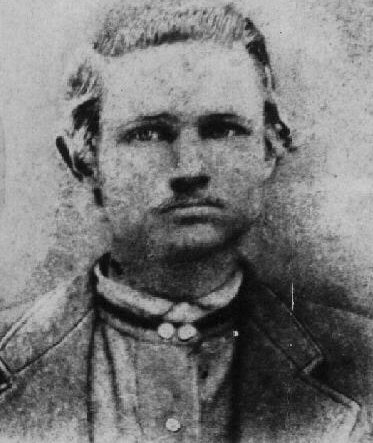
Rube Burrow
Born in Lamar County Alabama

Rube Burrow Train Robber. Rube Burrow born in Lamar County Alabama December 11, 1854, went to Texas in 1872, where he became a cowboy. It has been said that he could lift a 700 pound sack and walk off with it, easy. He was the outlaw king of Alabama and known as "Alabama Robin Hood", he never robbed a poor man.
Rube Burrow robbed his first train with the help of his brother, Jim Burrow and two cowboys on Dec 1, 1886 in broad open daylight. It was a passenger train on the Ft. Worth-Denver Railroad at Bellevue Texas, he took $300.00. Two weeks later, at Ben Brooks, Texas, he relieved the baggage car attendant of $4,000. For four years this bandit ranged the south always daring and always successful.
It doesn’t appear that Rube was a killer, but he was alleged to have killed a rural postmaster, Moses J. Graves, in Lamar County Alabama concerning a package addressed to an “alias “ in the county. It is said that things were hot for Rube as lawmen were all over Lamar County looking for him. He ordered from a mail order house false whiskers and a wig. When the package arrived at Jewell, Alabama, some of the hair was sticking out of the package, the postmaster refused to give the package to Rube's messenger, and it is said that Rube went to the post office to get the package and shot Mr. Graves through the heart and took the package with him. As I understand, there was no witness and another opinion is that it was one of Rube's men that shot Mr. Graves.
Few bandits in the south or southwest were so widely known from 1886-1890 as Rube. He would climb aboard the engine usually at night as it was pulling away from a station and force the engineer, at gunpoint, to stop the express car on solid ground, leaving the passenger car stranded on a trestle. By this method, Rube Burrow robbed so many trains that an engineer on the Texas &Pacific Line is said to have once asked "Where do you want me to stop this time?" and Rube replied "Same place".
Steel coaches and steel express cars, detectives said that it was a train that Rube Burrow couldn't rob. In fact they boasted so much about this train down in Mississippi that a newspaper even published a challenge to Rube to try to rob this express train. Rube accepted the invitation. It is said that Rube and his gang boarded the train at Bucatuna, Mississippi in September 1889. They dropped off at the next station with $3,500 from the mail and express cars. Rube was quoted as telling the express manager "Listen you, tell that boss of yours that I won't rob no more of his old cars unless he puts steps on them, it's too much trouble".
Burrow once stopped at a farm house to ask for food, while he ate the widow told of a $700 mortgage on her property that was past due and the banker was coming any minute to foreclose. Rube left, after giving the widow enough money to pay the mortgage, telling her to be sure and get a receipt. And the rest of the story . . . . Rube waited in the nearby woods for the banker when he left the widow's house and recovered his money!
Rube Burrow was captured by two black men, Jesse Hildreth and Frank Marshall with the help of two white planters, John McDuffie and Jeff Carter, at George Ford’s ( a black man) cabin , in the Myrtlewood Community of Marengo County, Alabama on Dec 7, 1890.
They carried him to jail in Linden, Alabama with Rube entertaining them all the way with funny stories. Rube offered Jesse Hildreth a hundred dollars if he would let him go. Jesse said "I couldn't use it then, cause you'd kill me first".
Rube escaped jail, locking two guards in his cell, and taking another guard as a shield and went across the street to Glass’ Store looking for Jeff Carter to get back money that had been taken from him. Jeff Carter was waiting in the store, when Carter came outside, he and Rube exchanged gunfire. Afterwards, Rube was dead in the street and Carter was wounded.
Rube Burrow’s body was shipped by train back to Lamar County. It was reported that on a stop in Birmingham thousands viewed the corpse and people snatched buttons from his coat, cut hair from his head and even his boots were carried away by persons. Rube’s father Allen Burrow met the train in Sulligent. It was reported that the train attendants threw the coffin at his feet. Allen Burrow carried his son, Rube’s body, back to his home community near Vernon and buried him in Fellowship Cemetery.
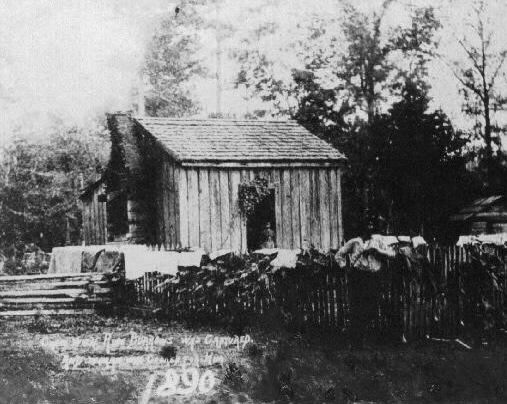
George Ford's Cabin, in Marengo County, AL, where
Rube Burrow was captured.
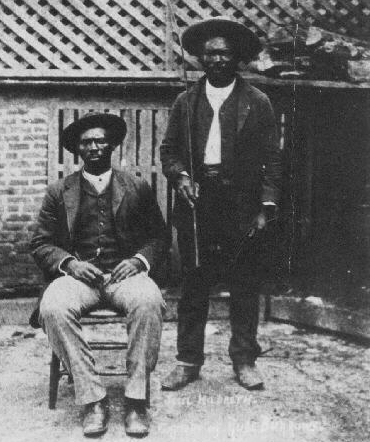
Jesse Hildreth and Frank Marshall, who with the help
of two white planters captured Rube Burrow.
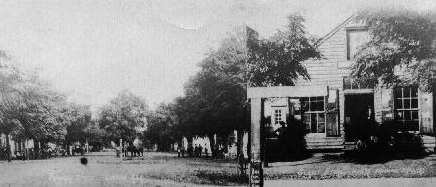
Street in Linden, Alabama where Rube Burrow was killed in a shoot-out with Jeff Carter.
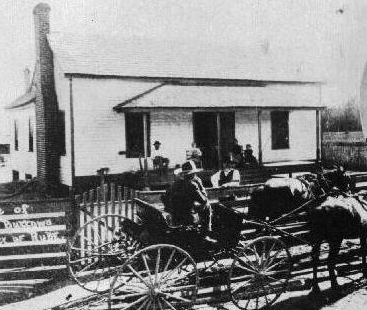
Feedback From Guests
"Barbara
"I just visited your web site and read the story of Rude Burrow.
My Great grandfather was said to have run with a "Rue Burr" around Lamar County back in those days. Could this have been Rube Burrow? "Rue Burr" was supposed to have been an outlaw. I know my great grandfather (George Washington Nolen) was supposed to have a friend called "Pump Tucker" or "Punk Tucker" who was supposed to also be a friend of this outlaw and one of the other of them had hung out with Sam Bass in Texas at one time or the other.
As a kid I was shown a photograph taken back then, and supposedly three of the men in the picture was G. W. Nolen, Pump Tucker and Sam Bass. They were at the base of a very large tree and one of them had his foot propped up on a big knot bulging from the base of the tree. There was either a wall or a cliff in the back ground that had a large group of men standing on it.
I once visited a house in Athens Texas that was supposed to have been the home of Sam Bass's parents and there had been an old glass factory not far from the house. I was helping one of the Bass descendants clean out the antiques from the house after his parents had died and we found an early photo supposedly taken near the house that looked very similar to the one I saw as a child. The old glass factory was gone but between it and the road, right near the house, was an extremely old oak tree with a large bulge at the base. I was then told that was supposed to be where the last photo of Sam Bass and some of his outlaw friends were taken at Athens.
Does any of this relate to what you or someone you know, may know about Rube Burrow?
Have you ever heard of a character named something like "Pump Tucker"?
Anything you may be able to enlighten me with would be appreciated. My father has been dead many years and so are most of his siblings but I grew up hearing stories about Pump Tucker and Rue Burr and would love to learn more about it.
Thank You."
Don Nolen
"I'm related in a very round about way to Burrows through the Taylor
family of Lamar County, and your web page on him is very welcome indeed,
for there seems to be very little about him on the internet.
I've heard the postmaster and whiskers story before, but this may
interest you: my father, who knew quite a bit about his Lamar County
relations, stated that it wasn't whiskers but an entire woman's outfit,
complete with face-covering hat, bustle, and petticoats. As in the
whiskers version, the postmaster became suspicious and was killed by
Burrows or one of his men.
My father also told a story--and I recall this but vaguely--of how
Burrow was being sought for in some town or another. In order to
escape, he waited until dark and then simply joined the posse that was
looking for him! Then, when the posse split up, he quietly rode away.
Hope these vaguely recalled stories amuse you. And again, thanks for
the web page--it's great! "
"Just a side note on Rube Burrow. My grandfather Andrew Jackson "Jack" Guyton told stories about how people used to come to the grave and chip off pieces of the tombstone. As the town constable he said that he spent many nights sleeping on the grave to catch and stop people from damaging the stone".
James Thomas
Return to
Lamar County Kin
Return to Just Across the Line
This page owned by Barbara Woolbright Carruth.